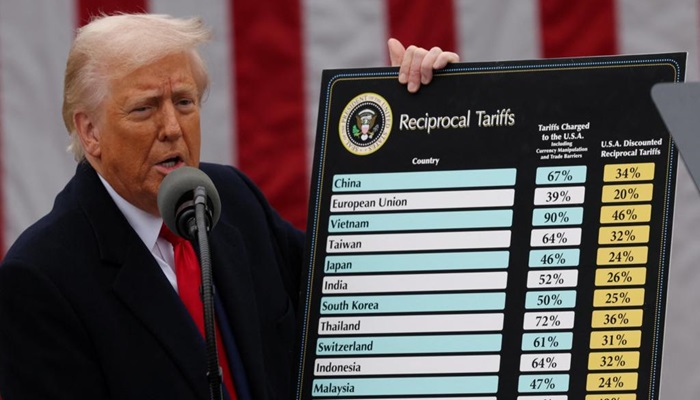TRUMP SLAPS NEW GLOBAL TARIFFS; GHANA FACES 10% IMPORT TAX

U.S. President Donald Trump announced steep new tariffs on imports from China, the European Union, and several other nations including Ghana escalating economic tensions and raising fears of a worldwide recession.
Speaking from the White House Rose Garden on Thursday, Trump declared a national economic emergency, invoking the 1977 International Emergency Powers Act to impose the measures without Congressional approval. The new policy includes a staggering 34% tariff on Chinese goods, a 20% levy on EU imports, and a 10% baseline tax on products from Ghana and other affected nations.
The president framed the tariffs as a long-overdue corrective to what he called decades of economic predation by foreign nations.
“Our country has been looted, pillaged, raped, and plundered by other nations,” Trump said. “American taxpayers have been ripped off for more than 50 years. But that ends today.”
The White House argues that the tariffs will revive U.S. manufacturing and force trading partners to renegotiate what Trump deems “unfair” deals. However, critics warn that the move risks triggering a destructive trade war, with Ghana and other developing economies caught in the crossfire.
The announcement sent shockwaves through financial markets, with U.S. stocks plunging as investors braced for higher consumer prices and disrupted supply chains. Analysts predict that the cost of everyday goods—from clothing to electronics—will surge, squeezing households and businesses alike.
Olu Sonola, Head of U.S. Regional Economics at Fitch Ratings, cautioned that the average U.S. tariff rate could skyrocket from 2.5% to 22%, a shift with dire global implications.
“Many countries will likely fall into a recession,” Sonola warned. “If these tariffs remain in place, economic forecasts will need drastic revisions.”
For Ghana, the 10% import tax poses a significant threat, particularly for exporters of cocoa, minerals, and textiles. Trade experts fear retaliatory measures from Accra could further strain bilateral relations, jeopardizing critical U.S. investment in the region.
The European Union has already vowed to retaliate, while China hit with an additional 20% penalty tax over its alleged role in the fentanyl crisis is expected to respond aggressively. Only Canada and Mexico, shielded by the USMCA trade pact, were spared from the new tariffs.
Source:NKONKONSA.com





